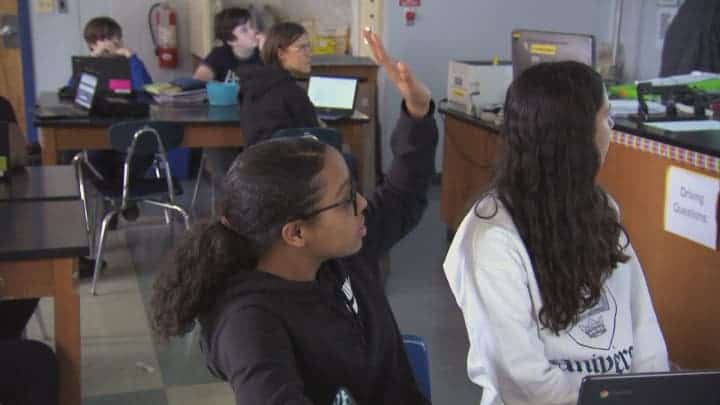As financial literacy advocates push for more personal finance education in schools, students are also joining the cause.
Only 21 states require personal finance coursework to graduate high school, with just a handful mandating a stand-alone class, according to the Council for Economic Education. Yet research shows that those who have some financial education typically have lower credit card balances, higher credit scores and take out smaller private loans for college.
“The economy has been fluctuating up and down,” said 15-year-old Zoe McCall. “We need to know these things.”
The high school sophomore lives in Maryland, one of the states that does not require the coursework for high school graduates. While McCall has regular conversations about money at home with her parents, not all of her classmates are as fortunate, she said.
So McCall, along with some of her peers, testified about the importance of a financial education before the Prince George’s County Board of Education in Upper Marlboro, Maryland, last March. The board passed a resolution requiring a personal finance course for all high school students in the region.
“I’m going to witness the change I made, and it’s just very, very exciting” said McCall, who is a self-described activist and entrepreneur with multiple side-businesses, including mask making and babysitting.
The state of Maryland may not be further behind the Prince George’s County School District. It is one of 25 states and the District of Columbia that have introduced bills in their 2021 legislative sessions to increase access to financial education, according to Next Gen Personal Finance, a non-profit group that creates free courses and funds training for high school teachers.
The bills range from forming task forces and commissions to developing standards for what should be taught and ensuring that every high school student takes a course.
“This is a movement,” Next Gen Personal Finance CEO and co-founder Tim Ranzetta said. “This is something [students and teachers] want.”
The financial uncertainty brought on by the pandemic helped mobilize the new wave of people joining the fight.
“Anytime there’s economic stress, there’s a renewed focus on how do we increase financial capability, and financial education is one component of that,” he added.
Advocates are not just focusing on high-school students.
In West Orange, New Jersey, 14-year-old Olivia Raymond took her first personal finance course in middle school last year. She and her classmates learned the fundamentals of money management, such as saving, investing, budgeting and donating.
A year later, she is still using those important money lessons.
“Those are skills that can be applied when I go for a job, when I apply to colleges,” Raymond said.
Kids even as young as 8 and 9 years old are being exposed to age-appropriate financial lessons. One online learning resource, SmartPath, focuses on children as young as kindergarteners by using music videos and interactive games to educate about financial topics.
The free content has become a vital resource for parents, said University of Cincinnati economist Julie Heath, who helped to develop the SmartPath curriculum.
“Financial education is learning how to critically think about all facets of your life, particularly money,” Heath said. “Why wouldn’t we start teaching that as soon as we could?”
In fact, by age 7, a lot of kids’ attitudes about consumption are set or beginning to form.
“We wanted to get this to students as soon as we can so they can develop responsible attitudes about money.”
Lee Jimenez, a teacher at Indian Hill Elementary School in Cincinnati, Ohio, uses the content to teach his third-grade students about money. One lesson was about payment methods.
For 9-year-old Roberto Nieves Fernandez, it drove home the importance of debt and how to manage it.
“You have to pay it back if it’s on a credit card,” he said.
While the lessons are starting to gain traction in schools around the country, there is still much more to be done, said McCall.
“It is very important for students to take the lead and be involved in this advocacy because it’s for us, this is what we want,” she said.
“This is going to impact us directly.”

